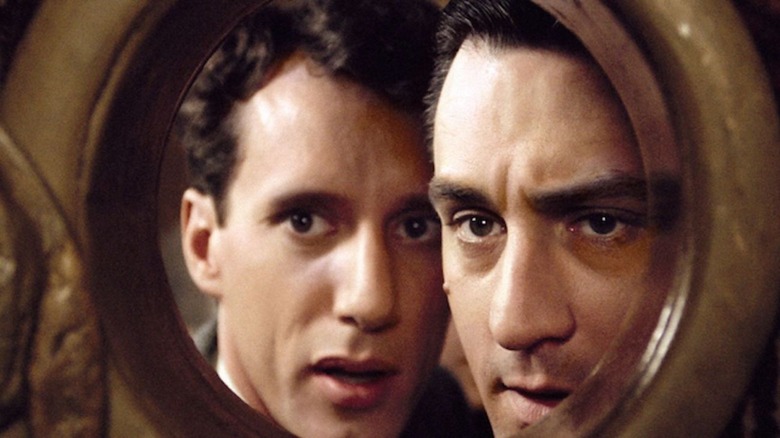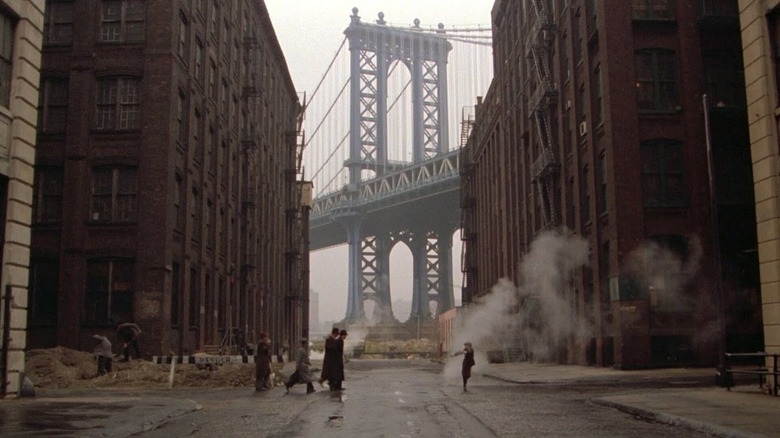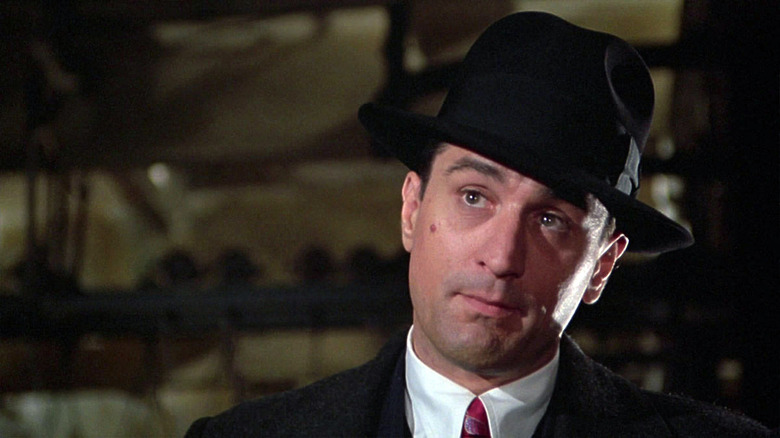Sergio Leone Saw Once Upon A Time In America As A Dying Breed Of Cinema
Sergio Leone's filmmaking instincts were unerring. Once he got his feet under him with "A Fistful of Dollars," he made masterfully composed widescreen Western epics that were dense with references to their genre predecessors. You don't have to be a movie buff to fall in love with a Leone film, but your enjoyment is certainly enhanced, particularly on multiple viewings, when you realize how deftly he's integrated the works of John Ford, Howard Hawks, Anthony Mann and so on into his mythic vision of the West. And while his Italian perspective, which spawned the label "Spaghetti Western," gave these films a vaguely European sensibility, he largely connected with audiences the world over because he spoke fluently the language of cinema.
Leone might've been an articulate filmmaker, but he was far from loquacious. He only spoke when he had something to say. This is why, after the completion of "Duck, You Sucker" in 1971, he turned down Paramount's offer to direct "The Godfather" and spent the next 10 years of his life developing his labor of love "Once Upon a Time in America." This would be his first time working within the realm of another quintessential Hollywood genre, the gangster film, so it was vital for him to nail the visual patois while adding his own peculiar inflections. As with "Once Upon a Time in the West," he wanted to make the grandest, most mythic mob movie of all time. Though he pulled it off, he couldn't help but feel a tad gloomy about the future of the medium he loved all out of proportion.
Leone was the last of his breed
Three years after the botched 1984 rollout of "Once Upon a Time in America" (The Ladd Company slashed his four-hour cut down to an incoherent 139-minute mess for its U.S. theatrical release), Leone told ASX's Marlaine Glicksman that he believed his form of filmmaking was passing out of style. The New Hollywood era of the 1970s was over. Movies were getting smaller and/or more formulaic. The appetite for sweeping, plan-your-day-around-them epics was rapidly diminishing.
Here's how he put it to Glicksman:
"I've always had the sensation that people in America are always avant-garde. Very attentive to all the new innovations. But it's very specialized. The American public is a very specialized public. The reason it is taken as a realistic film is because inside the fable, I've put that kind of reality in. And it could easily be called, instead of 'Once Upon a Time in America,' 'Once Upon a Time There Was a Certain Kind of Cinema.' Because it was also an homage to cinema. And there's my pessimism. Because I didn't know yet that type of film is always going to become more extinct, that there won't be anymore. Because there will always be more films that win five Oscars like 'Terms of Endearment.'"
Leone would've loathed superheroes
If Leone had an issue with James L. Brooks' finely wrought family drama, he would've been aghast had he lived to see the Weinstein-ification of the prestige film in the 1990s. Movies like "The Cider House Rules," "Chocolat" and "Iris" played as though they'd been shaved down to nothing but Oscar clip reels. They purported to be high-minded dramas for adults, but they were every bit as formulaic as an Ashley Judd thriller. And god knows how he would've reacted to the onset of the superhero era.
There were legitimate financial reasons for the phasing out of big-swing sagas like "Once Upon a Time in America." Michael Cimino's "Heaven's Gate" ruined United Artists, while The Ladd Company was effectively shuttered by the poor box-office performance of Philip Kaufman's "The Right Stuff." Hollywood execs had become risk averse for fear of losing their jobs. Leone realized this in the late 1980s as he scrambled to secure $100 million from Russian investors to mount "The 900 Days: The Siege of Leningrad." He was still $50 million short when he died of a heart attack in 1989.
Leone likely would've come close to his desired budget by securing the involvement of big names like Robert De Niro, but would there have been any U.S. interest in a Soviet Union-set World War II film during the glasnost era? Probably not, and it probably would've at least landed Leone in director jail. There isn't a cinephile alive today who doesn't mourn for what might've been, but it could've been a tragic, career-ending debacle for Leone. Perhaps it's best he didn't he didn't survive to see his pessimistic outlook turn into a harsh reality.


